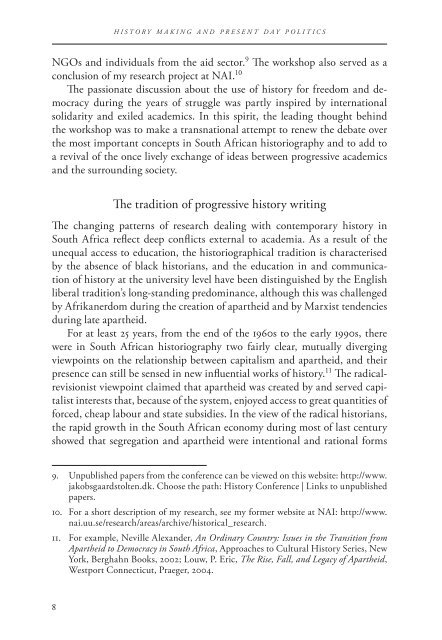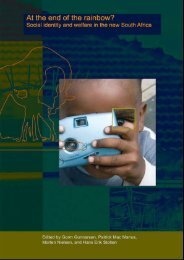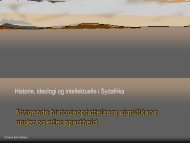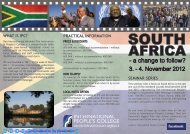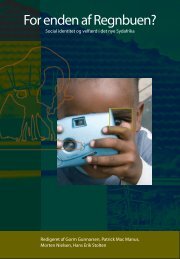History Making and Present Day Politics - Stolten's African Studies ...
History Making and Present Day Politics - Stolten's African Studies ...
History Making and Present Day Politics - Stolten's African Studies ...
Create successful ePaper yourself
Turn your PDF publications into a flip-book with our unique Google optimized e-Paper software.
h i s t o r y m a k i n g a n d p r e s e n t d a y p o l i t i c s<br />
NGOs <strong>and</strong> individuals from the aid sector. The workshop also served as a<br />
conclusion of my research project at NAI. 10<br />
The passionate discussion about the use of history for freedom <strong>and</strong> democracy<br />
during the years of struggle was partly inspired by international<br />
solidarity <strong>and</strong> exiled academics. In this spirit, the leading thought behind<br />
the workshop was to make a transnational attempt to renew the debate over<br />
the most important concepts in South <strong>African</strong> historiography <strong>and</strong> to add to<br />
a revival of the once lively exchange of ideas between progressive academics<br />
<strong>and</strong> the surrounding society.<br />
The tradition of progressive history writing<br />
The changing patterns of research dealing with contemporary history in<br />
South Africa reflect deep conflicts external to academia. As a result of the<br />
unequal access to education, the historiographical tradition is characterised<br />
by the absence of black historians, <strong>and</strong> the education in <strong>and</strong> communication<br />
of history at the university level have been distinguished by the English<br />
liberal tradition’s long-st<strong>and</strong>ing predominance, although this was challenged<br />
by Afrikanerdom during the creation of apartheid <strong>and</strong> by Marxist tendencies<br />
during late apartheid.<br />
For at least 25 years, from the end of the 1960s to the early 1990s, there<br />
were in South <strong>African</strong> historiography two fairly clear, mutually diverging<br />
viewpoints on the relationship between capitalism <strong>and</strong> apartheid, <strong>and</strong> their<br />
presence can still be sensed in new influential works of history. 11 The radicalrevisionist<br />
viewpoint claimed that apartheid was created by <strong>and</strong> served capitalist<br />
interests that, because of the system, enjoyed access to great quantities of<br />
forced, cheap labour <strong>and</strong> state subsidies. In the view of the radical historians,<br />
the rapid growth in the South <strong>African</strong> economy during most of last century<br />
showed that segregation <strong>and</strong> apartheid were intentional <strong>and</strong> rational forms<br />
. Unpublished papers from the conference can be viewed on this website: http://www.<br />
jakobsgaardstolten.dk. Choose the path: <strong>History</strong> Conference | Links to unpublished<br />
papers.<br />
10. For a short description of my research, see my former website at NAI: http://www.<br />
nai.uu.se/research/areas/archive/historical_research.<br />
11. For example, Neville Alex<strong>and</strong>er, An Ordinary Country: Issues in the Transition from<br />
Apartheid to Democracy in South Africa, Approaches to Cultural <strong>History</strong> Series, New<br />
York, Berghahn Books, 2002; Louw, P. Eric, The Rise, Fall, <strong>and</strong> Legacy of Apartheid,<br />
Westport Connecticut, Praeger, 2004.


